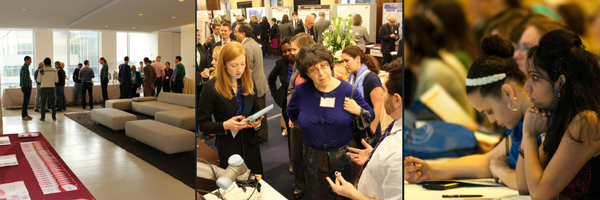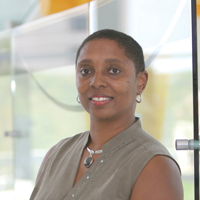CRA Activities and Initiatives
By CRA Board Chair Susan Davidson, University of Pennsylvania

CRA Board Updates
CRA members have elected two new members to its board of directors: Carla Brodley and Kim Hazelwood. Several current board members were also re-elected. Their terms run from July 1, 2017 through June 30, 2020. Beginning July 1, Brian Noble will be the USENIX representative to the CRA board, replacing Margo Seltzer. Retiring from the board as of June 30, 2017 are David Culler, Mary Czerwinski, and Seltzer. CRA thanks them all for contributions during their service on the board. At the CRA board meeting in February, the CRA board of directors voted to re-elect its current board officers to serve new two-year terms beginning July 1, 2017.
Report on Surge in Computer Science Enrollments
To investigate the current surge in computer science enrollments, CRA produced an enrollment survey to measure, assess, and better understand enrollment trends and their impact on computer science units, diversity, and more. The survey was administered in parallel with CRA’s annual Taulbee Survey of doctoral-granting units and ACM’s annual NDC Study of non-doctoral granting units in computing. Analysis of the survey is presented in a new report, Generation CS: CS Enrollments Surge Since 2006, available for download and online at: https://cra.org/data/generation-cs/.
To encourage a conversation about the content of the report, we have enabled a comments section located at the bottom of the main report webpage.
Over the past few months, CRA and its committees have been actively promoting our mission areas of leadership, policy, and talent development.
Leadership
CRA empowers the research community to broaden the scope of computing research and to amplify its impact on society.
Leadership Summit
On Monday, February 27, in Washington, D.C., CRA hosted its annual Computing Leadership Summit for the senior leadership of CRA member societies (Association for the Advancement of Artificial Intelligence, Association for Computing Machinery, CS-Can/Info-Can, IEEE Computer Society, Society for Industrial and Applied Mathematics, and USENIX Association) and the CSTB.
CRA Awards
The CRA board of directors is pleased to announce its selections for the 2017 CRA Awards. Tom Kalil, former deputy director for technology and innovation, White House Office of Science and Technology Policy, will receive the Distinguished Service Award. Carol Frieze, director of SCS4ALL and Women@SCS, Carnegie Mellon University, will receive the A. Nico Habermann Award.
Computing Community Consortium (CCC)
The mission of the CCC is to catalyze the computing research community and enable the pursuit of innovative, high-impact research.
CCC recently issued a call for proposals for workshops that will catalyze and enable innovative research at the frontiers of computing. Below is a list of recent workshops that were sponsored by the CCC:
- Cyber Security for Manufacturers
- Cyber-Social Learning Systems
- Discovery and Innovation in Smart and Persuasive Health
- Sociotechnical Cybersecurity
One outcome of CCC visioning activities is workshop reports on the research area. CCC has recently published the following reports:
- Artificial Intelligence for Social Good
- Nanotechnology-Inspired Information Processing Systems of the Future
- Discovery and Innovation in Smart and Pervasive Health
The CCC also produces white papers on subjects important to the community. Below is a list of recently published CCC-led white papers:
- Safety, Security, and Privacy Threats Posed by Accelerating Trends in the Internet of Things
- Advances in Artificial Intelligence Require Progress Across all of Computer Science
- Privacy-Preserving Data Analysis for the Federal Statistics Agencies
- Arch2030: A Vision of Computer Architecture Research over the Next 15 Years
- Intelligent Infrastructure
The CCC participated in the American Association for the Advancement of Science (AAAS) 2017 Annual Meeting in Boston, MA. Below are some highlights:
- Press Briefing on Mobile Health Devices: Health in Your Pocket: Diagnosing and Treating Disease with Smartphones
- What Happens When Everyday Objects Become Internet Devices: A Science Policy Agenda
- The Technology of the Future
The CCC also responded to the request for public comment on the Networking and Information Technology Research and Development (NITRD) program’s draft Smart Cities and Communities Federal Strategic Plan. The CCC response to the draft strategic plan describes several challenges that merit increased attention.
For additional information on CCC initiatives and related activities, subscribe to the CCC Blog.
Policy
CRA Policy Blog Highlights
The CRA Policy Blog provides advocacy and policy analysis for the computing research community. Click here to subscribe.
Below are some notable posts during recent months:
- Trump Budget Blueprint Slashes Science, Boosts Defense
- House Science Committee Releases Views & Estimates for FY 2018; Prioritizes Computing at Expense of SBE Again
- New Report on US Research Investment: “The Future Postponed 2.0”
- CRA Expresses Concern at New Executive Order Suspending Visas
- Travel Ban v. 2.0
- House Passes DOE Energy Research and Innovation Act
Talent Development
CRA cultivates talented computing researchers, helping prepare them to achieve success throughout their research careers.
Committee on the Status of Women in Computing Research (CRA-W)
CRA-W programs aim to increase the success and participation of women and other underrepresented groups in computing.
CRA-W continues to reach a diverse group of undergraduates with its Virtual Undergraduate Town Hall program. The next event, Privacy in Today’s World, will be held on April 18.
The Collaborative Research Experience for Undergraduates (CREU) program is looking for faculty mentors. CREU provides research stipends to teams of students working on research projects under the guidance of a mentor at their home institutions. The application period is open from April 18–May 18.
CRA-W is gearing up for its Grad Cohort Workshop on April 7-8. Grad Cohort brings together women graduate students in their first, second, or third year of graduate school for a two-day workshop on graduate school survival, career planning, and networking. Grad Cohort also has generous sponsorship from several organizations, including numerous university and college department sponsors. As a benefit to its members, CRA provides priority in the selection process for Grad Cohort applicants who come from CRA member departments. New this year, organizers are working with ACM-W to identify and host a group of international observers to attend the workshop for the purpose of training them to create similar workshops in other regions of the world. In addition, observers interested in planning a workshop for underrepresented minorities in computing will also be in attendance.
This past November, CRA-W hosted Early and Mid Career Mentoring Workshops (CMWs) in Washington, D.C. The Early CMW brought junior researchers and educators together with women already established in their field to provide practical information, advice, and support to their younger colleagues. The Mid CMW provided advice and mentoring to faculty members
seeking promotion to full professor and researchers/technologists in industrial or governmental labs seeking promotion to the top of their institution’s technical ladder or entering upper management.
This past fall, CRA-W’s Virtuous Cycle of Giving program sought donations from individuals to increase the amount of funding available for program participants and to create a virtuous cycle of support among recent and past participants, speakers, emeritus members, CRA board members, and friends. By the end of last year, contributions totaling more than $15,000 from 54 individuals were received. Donors are recognized in CRA-W’s latest newsletter, which also highlights alums, senior women in computing, and CRA-W programs.
Please share information about CRA-W opportunities with your students and subscribe to CRA-W updates.
CRA Education Committee (CRA-E)
CRA-E works to address society’s need for a continuous supply of talented and well-educated computing researchers.
CRA-E’s activities focus on promoting and recognizing undergraduate research, providing resources to faculty to prepare talented students for research, recognizing exceptional faculty serving as research mentors to undergraduates, and encouraging undergraduates to pursue graduate education and research careers in computing fields.
CRA is pleased to welcome its new 2017 CRA-E Graduate Student Fellow – Booma Sowkarthiga Balasubramani. She is a Ph.D. student in computer science at the University of Illinois at Chicago is a Ph.D. student in computer science at the University of Illinois at Chicago, and her research interests include data integration, semantic web, information retrieval and data mining. The Graduate Fellows Program was established in 2015 to give graduate students the opportunity to contribute to CRA-E projects, engage in advocacy for mentoring undergraduate students, and promote computer science research and undergraduate education at the national level.
Earlier this year, CRA-E selected three 2017 awardees: Margaret Burnett from Oregon State University, Nayda Santiago from the University of Puerto Rico, Mayaguez Campus, and Margo Seltzer from Harvard University. These outstanding individuals are recognized for providing exceptional mentorship, undergraduate research experiences, and, in parallel, guidance on admission and matriculation of their students to research-focused graduate programs in computing.
This past fall, CRA-E completed its “Videos for Undergraduates” project. These short videos showcase recent CS Ph.D.’s talking about why they chose to pursue a Ph.D. and how their advanced degree helps them in their work in industry. The videos have been widely circulated and some departments are linking them from their departmental webpages and/or showing these videos in class.
In December 2016, CRA-E announced the recipients of the 2017 CRA Outstanding Undergraduate Researcher Award. The nominees were commended for making significant contributions to more than one research project, several were authors or coauthors on multiple papers, others had made presentations at major conferences, and some had produced software artifacts that were in widespread use.
CRA-E members facilitate running workshops on Engaging Undergraduates in Research at major computer science research conferences. The workshops present and discuss best practices on mentoring undergraduate researchers. The intended audience is graduate students, postdocs, faculty, and researchers who are interested in mentoring undergraduates. To find out how to get CRA-E run such a workshop at a conference in the US, contact crae-info@cra.org.
Do you have a research opportunity for undergraduates available? Advertise it for free on CRA-E’s Undergraduate Listing Service, available on the Conquer site.
Evaluation
Center for Evaluation the Research Pipeline (CERP)
The CERP is an evaluation and research center designed to help increase diversity in the field of computing research.
CRA wishes to thank the computing departments who distributed CERP’s Data Buddies survey during the fall of 2016. The collective effort of these departments provides data for CERP’s research on students’ experiences and successes in computing degree programs.
Since May 2013, the CERP team has published an infographic in each issue of Computing Research News (CRN) that analyzes the experiences of underrepresented students and professionals in computing. Each month, this newsletter will share the infographic published in CRN and news about CERP. If you are interested in receiving this newsletter, subscribe here.
Recent CERP infographics include:
- Participation Rate in Computing-Related Contests Highest Among Men, and Among Asian Students
- Nearly 10 Years Later, CRA-W Career Mentoring Workshop Participants are More Advanced in their Careers Than Non-Participants
- Difficulties with Coursework Make Students Consider Leaving Computing; Job Prospects and Support from Friends and Family Help Students Stay
- After Leaving Computing, New Majors Tend to Differ by Gender
- Undergraduate Computing Majors Talk about Institutional Support at Their College or University for Becoming a Middle or High School Teacher
A paper from CERP was recently named an “Exemplary paper” in the 2017 SIGCSE Proceedings. The paper, “Examining the Relationship Between Introductory Computing Course Experiences, Self Efficacy, and Belonging Among First Generation College Women,” was written by Jennifer Blaney, a Ph.D. student at UCLA and the senior data manager for the BRAID research project, and Jane Stout, director of CERP.
Surveys
Data from the annual CRA Taulbee Survey is currently being analyzed and the full Taulbee report will be sent to CRA members and participating departments in the next few weeks and will be available to the public in the May issue of CRN. If you have any questions, contact Betsy Bizot at bizot@cra.org.
Upcoming Activities
April
7-8 – CRA-W Grad Cohort Workshop
18 – CREU Application Opens
18 – CRA-W Undergraduate Town Hall: Privacy in Today’s World
May
18 – CREU Application Deadline
21-25 – CRA-W Outreach – NCWIT Summit 2017
June
15 – Proposal Deadline for Discipline Specific Workshop
Ongoing
- CCC Call for Proposals: Creating Visions for Computing Research
- CRA-Women Distinguished Lecture Series – Accepting Proposals
- Undergraduate Listing Service – Post a Research Opportunity
- Congressional Visits – Contact Brian Mosley (bmosley@cra.org)
- Blue Sky Ideas Conference Track – Accepting Proposals



